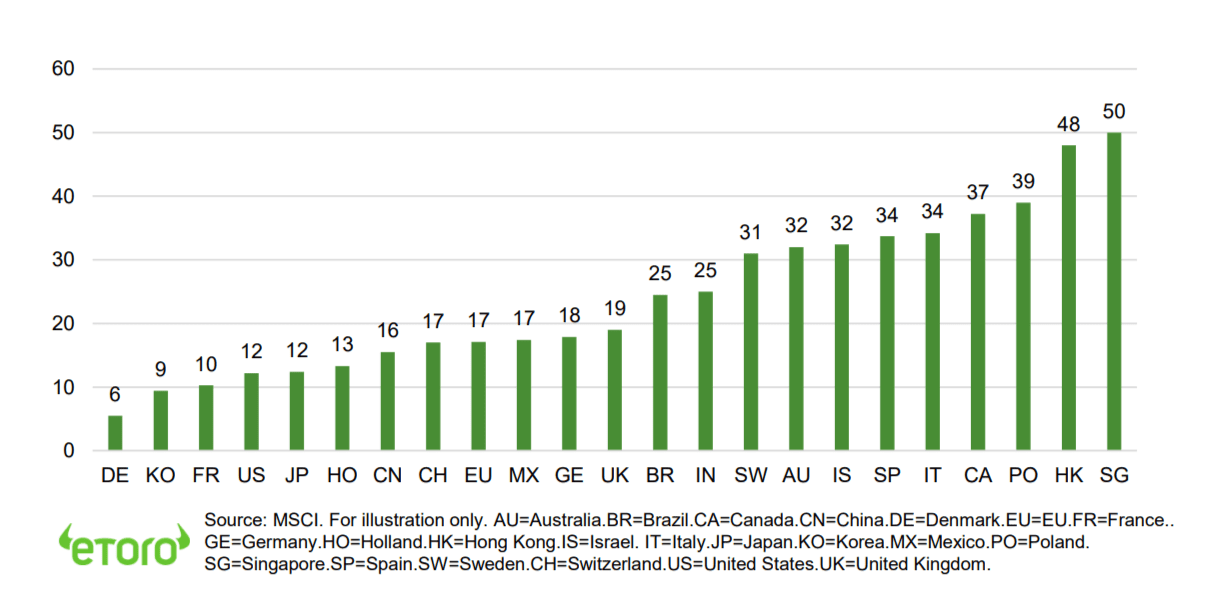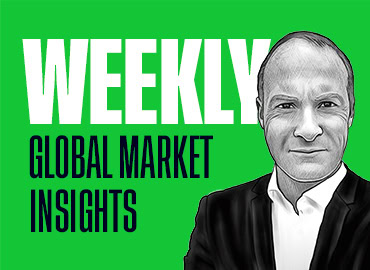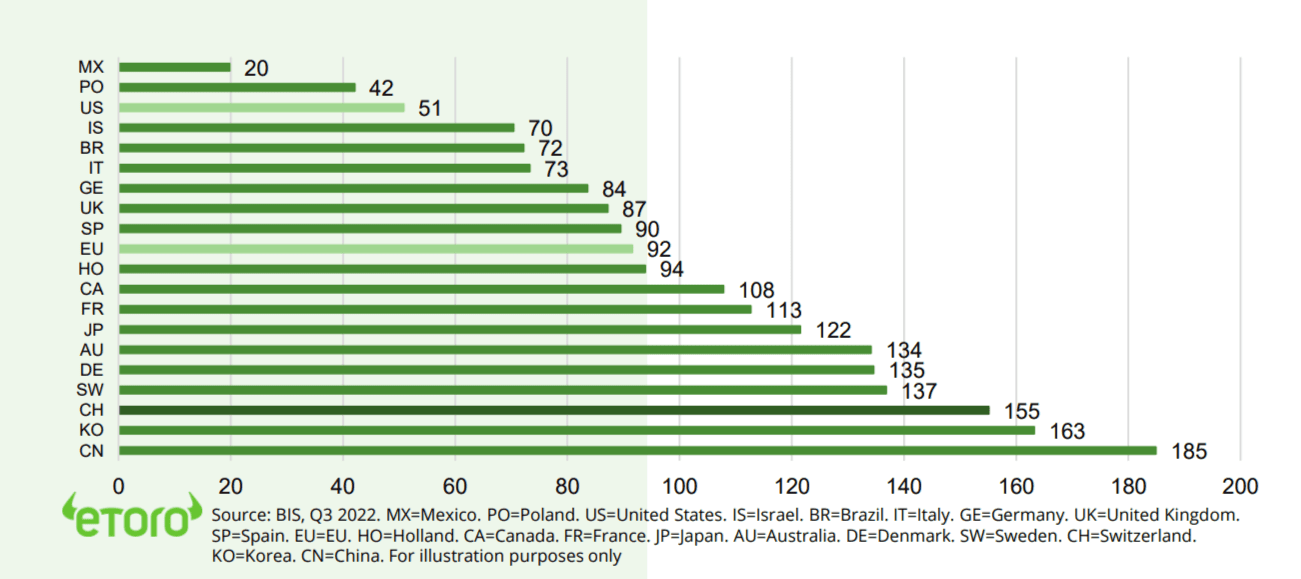Summary
Bank problems accelerate the macro outlook
Bank contagion is not a 2008 repeat but will have a big impact. Fed backstops US system with $300 billion help and is set for less rate hikes. Europe not immune to contagion fears, but is in a more secure position. Events of the past week have tightened financial conditions and mean less rate hikes, lower bond yields, and slower economies. This accelerates our 2023 stock view of earnings downside but valuation upside. This new macro outlook is less good for banks, with big spread of economy and market exposures.
Banking concerns impact across asset classes
US stocks rose with banks help and a tech rally. Contagion spread to Europe and ECB hiked 0.5% and pledged bank help. Bond yields plunged on less rate hike views. Commodities on recession fear. Bitcoin soars on fiats problems. SNB helped CS. META cut jobs. PFE bought SGEN. VOW3 huge investments. See our 2023 Year Ahead HERE. See video updates, twitter @laidler_ben.
European banks are different
Europe’s banking system is different to US. More resilient, with more capital and tighter regs. But costs of a failure are bigger, with high loans/GDP.
The US inflation fall is stalling
US inflation was market most important number. Now overtaken by bank concerns, that doing Fed’ job for it. Price rises have fallen for 8 months, to 6.0%, but the pace is now stalling.
Learning from the PMI’s
Global PMI’s been rising for three months and now above breakeven 50. China and services led, but rebound broad by country and industry. Is a key, timely, forward looking resource.
Breaking up is hard to do
Corporate spin offs or break ups back in favour, Are 30 in pipeline from GE to MMM. But also see ‘new conglomerates’ from PE to tech.
Crypto benefits from fiat fears
Bitcoin (BTC) surged by a third to over $26,000, taking return this year to 60%. Seen benefitting from concern over ‘TradFi’ banking system, lower bond yields and the Fed’s help to crypto supportive bank, Signature. Ethereum (ETH) helped by Arbitrum’s airdrop. Meme coins held back by broader market volatility.
Precious metals shine as a safer haven
Global banking fears stoked commodity demand fears. Bloomberg commodity index is now 10% below Ukraine invasion levels. Brent crude led weakness, alongside EU carbon credits. Precious metals rose sharply on demand for safer-haven assets and helped by lower bond yields. Ag also higher on Black Sea grain talks.
The week ahead: Fed, BoE, PMI…and Banks
1) Banking contagion may hold Fed to 0.25% hike or less (Wed). 2) BoE follows with maybe last hike of this cycle (Thu). 3) Global flash PMIs (Fri) give a macro health check, and first signs of contagion costs. 4) NKE, FL, CAN, GIS, CHWY, GME earnings and new GICS sectors start trading.
Our key views: Accelerated macro outlook
Banking fears individual not systemic. But doing Fed’s job for it. Accelerating GDP and inflation slowdown and interest rate peak. See gradual recovery with bumps in road. Slowdown hurts earnings. Less yields help valuation. Focus cheap and defensive assets, from healthcare to big tech More cautious on cyclicals and banks.
Top Index Performance
| 1 Week | 1 Month | YTD | |
| DJ30 | -0.15% | -5.81% | -3.88% |
| SPX500 | 1.43% | -3.98% | 2.01% |
| NASDAQ | 4.41% | -1.33% | 11.12% |
| UK100 | -5.33% | -8.36% | -1.56% |
| GER30 | -4.28% | -4.61% | 6.07% |
| JPN225 | -2.88% | -0.65% | 4.75% |
| HKG50 | 1.03% | -5.80% | -1.33% |
*Data accurate as of 13/03/2023
Market Views
Banking concerns impact across asset classes
- US stocks rose with big banking sector support, as contagion spread to Europe. ECB hiked 0.5% and pledged bank support. Bond yields plunged on lower rate hike views. Commodities on rising recession fears. Bitcoin rose on fiats problems. SNB moved to help CS. META cut jobs again. PFE bought SGEN for $43bn. VOW3 latest huge EV investment. See our 2023 Year Ahead View HERE.
European banks are different
- US banking system concerns spread to Europe last week. The Stoxx 600 Banks index, Europe’s biggest sector, fell 15% in a week. The Swiss National Bank moved to support CS. Whilst the ECB has pledged banking system help if needed.
- Europe’s banking system has key differences vs US. This makes a big bank failure less likely. Capital is higher and regulations tighter. But a failure, however unlikely, could have a bigger impact (see chart), with high loans/GDP, and take longer to resolve. We see bank risks as specific. But this support will be for the banking system and depositors not necessarily for either share or bondholders. Caveat emptor.
The US inflation fall is stalling
- US inflation was the most important number in markets. Driving ‘data-dependent’ Fed, rate hike forecasts, recession risks, and earnings expectations. Been overtaken by banking system concerns, that are tightening conditions and doing Fed’s job for it. Saving banks was the reason for the Fed’s founding in 1913.
- Our inflation tracker shows a stalling prices fall. 5 of our 12 indicators rose last month, led by housing, jobs, and car prices. Last month’s US headline inflation saw an 8th straight fall to 6.0% vs prior 6.4%. Whilst core inflation only inched lower from 5.6% to latest 5.5%.
Learning from the PMI’s
- Global PMI’s have been rising for three months and are above breakeven 50 level for first time in seven months. China and services led, but rebound been broad-based by country and industry. Brazil been unique outlier. This is indicative of lower near-term recession risks, with the world economy growing around 2.5%, and with less-bad earnings outlook.
- But underlying PMI data tells other stories, of sticky prices and jobs. This would force Fed to cool this rebound. But todays financial system contagion is now doing this financial tightening for them, cutting consensus outlook to one final 0.25% rise. The next PMI comes Friday, just after the FOMC.
Breaking up is hard to do
- Corporate spin offs or break ups seen a return to favour. Managements and activists now focused on how to generate returns in tougher environments. 30 major spin-offs are in pipeline. From GE to MM and K to NVS. Plus maybe UBER to HSBC.
- But spinoffs struggled overall. Whilst benefits of size and diversification clearer in today’ higher risk world. And ‘new conglomerates’ of big-tech and private equity join long-standing exceptions like Warren Buffett’s Berkshire (BRK).
Bank loans as % of GDP around the world
Crypto seen to benefit from fiat fears
- Bitcoin (BTC) led a crypto price surge, up a third in just a week to over $26,000. Took its gains this year near 60%, the most of all asset classes. Was driven by comparison with problems in ‘TradFi’.
- Lower US bond yields and the Federal Reserve help for crypto-supportive bank Signature (SBNY) also helped sentiment across the asset class.
- Meme coins SHIBxM and DOGE were the price exceptions, held back by high markets volatility.
- Ethereum (ETH) helped as Arbitrum, the largest layer 2 scaling solution, announced an airdrop.
Precious metals shine as a safer haven
- Commodity prices fell further as global financial sector volatility stoked growth and demand fears. The Bloomberg commodity index is now 10% below levels prior to Russia’s invasion of Ukraine.
- Brent crude prices were especially impacted, falling over 10% during week. This also dragged previous high-flying EU carbon credit prices. OPEC+ is due to meet April 2nd, and talk building of US moves to start refilling its strategic reserve.
- By contrast, the combination of soaring demand for safer investment havens and lower US bond yields drove strong gold and silver price rises.
- Finally, Russia’s attempt to shorten the Black Sea grain export initiative boosted cereals prices.
US Equity Sectors, Themes, Crypto assets
| 1 Week | 1 Month | YTD | |
| IT | 5.91% | 1.82% | 14.91% |
| Healthcare | 1.43% | -5.16% | -7.21% |
| C Cyclicals | 1.51% | -7.04% | 8.20% |
| Small Caps | -2.64% | -11.33% | -2.01% |
| Value | -1.67% | -7.90% | -6.11% |
| Bitcoin | 33.98% | 7.93% | 62.13% |
| Ethereum | 22.90% | 1.94% | 46.07% |
Source: Refinitiv, MSCI, FTSE Russell
The week ahead: Fed, BoE, PMI, Banking systems
- Continued fears over global banking systems is expected to see the Fed raise interest rates by only 0.25% to 5.0% (Wed). In its 7th straight hike. They will also publish new projections on their outlook for the economy and interest rates.
- Bank of England (BoE) is set to follow with a 0.25% rise to 4.25% (Thu) as it potentially comes to the end of its hiking cycle after 11 straight increases.
- The flash March PMI’ (Fri) for Japan, Australia, UK, Europe, and US are a timely health-check on the recent GDP recovery, still sticky inflation, and the early impact of recent financial sector instability.
- Final Q4 earnings see sportswear giant NKE, shoe retailer FL, professional services ACN, breakfast staples GIS, online pet store CHWY, meme stock GME. Plus first day after GICS sector rebalancing.
Our key views: An accelerated macro outlook
- Banking sector fears are likely individual not systemic. Bank buffers are bigger now and the authorities response stronger. But this is doing the Fed’s job for it. By accelerating the GDP and inflation slowdown and the interest rate peak.
- See a gradual market recovery with plenty bumps in road. Faster slowdown hurts earnings. But lower bond yields helps valuation. Focus on cheaper and more recession defensive assets, from healthcare to derated big tech. More cautious on assets most exposed to recession risk, like cyclicals, small caps, and commodities. Or lower yields, like banks.
Fixed Income, Commodities, Currencies
| 1 Week | 1 Month | YTD | |
| Commod* | -1.87% | -3.70% | -9.05% |
| Brent Oil | -12.31% | -12.84% | -15.72% |
| Gold Spot | 6.46% | 7.69% | 8.94% |
| DXY USD | -0.68% | 0.00% | 0.33% |
| EUR/USD | 0.25% | -0.25% | -0.32% |
| US 10Yr Yld | -27.50 | -39.11 | -44.91 |
| VIX Vol. | 2.86% | 27.42% | 17.72% |
Source: Refinitiv. * Broad Bloomberg index. * Basis point
Focus of Week: Financial system concerns accelerate our view
Banking sector contagion is not a 2008 repeat but will still have significant consequences
Bank volatility saw painful flashbacks to 2008 financial crisis and 2010’s eurozone debt crisis. Markets are nervous and banks unique, given importance to economy and dependence on confidence. This is a specific not systemic issue. Its not 2008. But there are big impacts. It tightens financial conditions, raises recession risk, lowering bond yields, and needs less rate hikes. It accelerates our 2023 view of valuation relief but earnings pressure. Helping defensives from big tech to healthcare. Hurting growth sensitive commodities to small cap. It undermines case for banks, with wide spread of economy and market (see below) impacts.
Fed quick to backstop the financial system with $300 billion help, and now set for less rate hikes
The US has seen the failure of Silvergate, Silicon Valley and Signature Banks. These were the 2nd and 3rd largest failures ever in the US. The driver was liquidity not credit quality issues. The authorities have been quick to intervene, guaranteeing all deposits at those banks, and providing $300 billion liquidity help to the entire system. This will restrain the Fed, with less rate hikes ahead, and lower-than-otherwise bond yields.
Europe has not been immune to bank contagion fears, but is in a more secure position
Europe’s situation is different to the US. Bank risks are lower, with higher capital levels, more regulation, and consolidation. But the impact of any failure is greater, with loans/GDP much higher and regulation more fragmented. But the toolkit is big and will be used to protect the system and depositors, but not directly share or bond holders. The Swiss National Bank has launched support and the ECB said it is ready.
Events of the past week have tightened financial conditions and mean less rate hikes ahead
These financial system stresses will have an economic impact. Banks will be more cautious in lending. Companies more cautious in borrowing. This will slow down economies, and cool inflation. This tightening of financial conditions is doing central banks job for them and is equivalent to a big rate hike. This accelerates our 2023 view. Of slower economic growth, peaked interest rates, and lower bond yields.
Lower interest rates and slower growth hurt banks but may help tech. Some markets more exposed
Higher recession risks are bad for cyclical stocks and small caps and commodities. Its better for traditional defensives, like healthcare, and big tech. A faster slowdown, lower bond yields, and more valuation sensitivity is bad for banks – even if current concerns blow over. We are more cautious the sector (see our ‘traffic lights’), and more positive big tech. Some markets are more exposed than others (see below chart).
Financials Sector as % of total Stock Index

Key Views
| The eToro Market Strategy View | |
| Global Overview | Aggressive Fed interest rate hiking cycle and stubborn inflation boost uncertainty, recession risk, and hurt markets. We see this gradually fading in 2023, with global growth stressed but resilient, inflation pressure slowly easing, and valuations now more attractive. Focus on cheap and defensive assets for a gradual ‘U-shaped’ market recovery. |
| Traffic lights* | Equity Market Outlook |
| United States | World’s largest equity market (60% of total) seeing slowing but resilient GDP and earnings growth. Valuations led the market rout, and now at average levels, and are supported high company profitability and near peak bond yields. Focus on cash-flows defensives, like healthcare and high dividend. Big-tech supported by defensive growth. See gradual ‘U-shaped’ rebound as inflation slowly falls and de-risks market and tech/small cap/crypto appetite. |
| Europe & UK | Favour defensive and cheap UK (‘Economies not stock-markets’) and continental European equities. Recession risk easing with lower natgas prices amd reopening China with high ‘buffers’ of rising fiscal spending (defence and refugees) and weak Euro (50%+ sales overseas). Even as ECB hikes aggressively. Equities cushioned by lack of big tech sector and 30% cheaper valuations vs US. Banks better capitalised and regulated but loans/GDP much higher. |
| Emerging Markets (EM) | China, Korea, Taiwan dominate EM (60% wt.), and more tech-centric than US. Positive on China as economy reopens, cuts interest rates, and eases tech regulation crackdown. Valuations 40% cheaper than US and market out of favour. Recovery helps global sectors from luxury to materials. Broader EM needs weaker USD and peak US rates catalyst. |
| Other International (JP, AUS, CN) | Canada and Australia benefit from strong equity market weight in commodities and financials, if global growth resilient and bond yields risen. Japanese equities among worlds cheapest but threatened by tightening monetary policy and stronger Yen with rising inflation and new BoJ governor. |
| Traffic lights* | Equity Sector & Themes Outlook |
| Tech | ‘Tech’ sectors of IT, communications, consumer discretionary (Amazon, Tesla), dominate US and China. Hurt by higher bond yields and above average valuations. But structural stories with good growth, high margins, fortress balance sheets support some. ‘Big-tech’ attractive new recession defensives. ‘Disruptive’ tech is much more vulnerable. |
| Defensives | More attractive as macro risks rise and bond yields better priced. Consumer staples, utilities, real estate attractive defensive cash flows, less exposed to rising economic growth risks, and robust dividends. Offset impact of higher bond yields. Healthcare most attractive, with cheaper valuations, more growth, some rising cost protection. |
| Cyclicals | High risk cyclical sectors – like discretionary (autos, apparel, restaurants), industrials, energy, materials, and small caps – have cheap valuations, many with depressed earnings, and have been out-of-favour for many years. But they are significantly exposed to rising recession risks. Some especially cheap (energy) or see growth recovery (airlines). |
| Financials | Current stresses likely individual not systemic. Post GFC reforms boosted capital and size/speed of authorities response. But outlook for 1) less GDP growth, 2) lower bond yields and interest rates, and 3) valuation sensitivity after recent surprises, worsens outlook. Insurance and Diversifieds (like Berkshire Hatheway) more defensive. |
| Themes | Dividends and buyback themes attractive with resilient cash flows, rising pay-outs, and investor search for defensives. Power of compounding dividends under-estimated, at up to 1/2 of total long term return. Small caps pressured by rising recession risk. Secular growth of Renewables and Disruptive Tech investment themes. |
| Traffic lights* | Other Assets |
| Currencies | USD ‘wrecking ball’ driven by Fed interest rates and ‘safer-haven’ bid. DM currencies hurt by still low interest rates and struggling growth. Strong USD hurt EM, commodities, US foreign earners like tech. But helps big EU and Japan exporters. See a stabler USD outlook in 2023 as near top of the Fed cycle and global risks remain high. |
| Fixed Income | US 10-yr bond yields supported around 4% by higher Fed rate hike and stickier inflation expectations. Set to ease as recession risks slowly build and inflation expectations gradually fall. US has wide spread to other market bond yields, and headwinds of high debt, poor demographics, and low productivity. 5% bill yields an attrative cash alternative. |
| Commodities | Strong USD and rising recession fears hit commodities. But still above average prices helped by GDP growth, ‘green’ industry demand, supply under-investment, recovering China, Russia supply crisis. Oil helped by slow return of OPEC+ supply and Russia 10% world oil supply problems. But commodities not to repeat their 2022 performance leadership. |
| Crypto | Potential ‘surpsise’ after dramatic and early asset class sell-off and later specific risk events from Luna to FTX. See long term asset class development with small size $1 trillion, correlations low, regulation growing, development/catalysts continuing – Ethereum merge to proof-of-stake and coming BTC halving. |
| *Methodology: | Our guide to where we see better risk-adjusted outlook. Not investment advice. |
| Positive | Overall positive view, and expected to outperform the asset class on a 12-month view. |
| Neutral | Overall neutral view, with elements of strength and weakness on a 12-month view |
| Cautious | Overall cautious view, and expected to underperform the asset class on a 12-month view |
Source: eToro
Analyst Team
| Global Analyst Team | |
| CIO | Gil Shapira |
| Global Markets Strategist | Ben Laidler |
| United States | Callie Cox |
| United Kingdom | Adam Vettese Mark Crouch Simon Peters |
| France | Antoine Fraysse Soulier David Derhy |
| Holland | Jean-Paul van Oudheusden |
| Italy | Gabriel Dabach |
| Iberia/LatAm | Javier Molina |
| Nordics |
Jakob Westh Christensen |
| Poland | Pawel Majtkowski |
| Romania | Bogdan Maioreanu |
| Asia | Nemo Qin Marco Ma |
| Australia | Josh Gilbert |
Research Resources
Research Library
eToro Plus: In-Depth Analysis. Dive deeper into market insights: Read daily, weekly and quarterly summaries, catch up on the latest market trends and get the most recent, in-depth overview of markets.
Presentation
Find our twice monthly global markets presentation on the multi-asset investment outlook.
Webinars
eToro CLUB members can join our live Weekly Outlook webinars every Monday at 1pm GMT. Also see the other online courses and webinars.
Videos
Subscribe to our timely video updates on market moving events, and the ‘week ahead’ view
Follow us on twitter at @laidler_ben
COMPLIANCE DISCLAIMER
This communication is for information and education purposes only and should not be taken as investment advice, a personal recommendation, or an offer of, or solicitation to buy or sell, any financial instruments. This material has been prepared without taking into account any particular recipient’s investment objectives or financial situation and has not been prepared in accordance with the legal and regulatory requirements to promote independent research. Any references to past or future performance of a financial instrument, index or a packaged investment product are not, and should not be taken as, a reliable indicator of future results. eToro makes no representation and assumes no liability as to the accuracy or completeness of the content of this publication.




